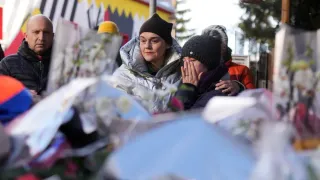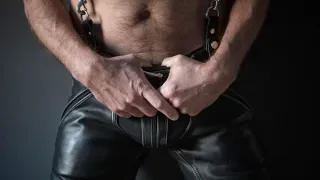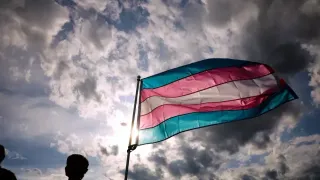September 7, 2016
Jeff Mann on "Country"
Kilian Melloy READ TIME: 16 MIN.
Novelist; essayist; short story writer; poet. Whether historical drama or contemporary horror, Jeff Mann has probably just about written it all. Now he's turned his pen to another of his fortes, the gay romance... this time with a country music angle.
Set in the 1990s, Mann's new novel "Country" -- out now from Lethe Press -- follows the spiritual healing of country star Brice Brown, a bearish man who's been finding the closet getting smaller and smaller... but who hasn't been ready to leave it until circumstance force him out, with career-ending results. Overnight it's all gone: Glamorous wife, sprawling home, money, fans, future.
Taking shelter at a mountain retreat run by a wealthy gay man, Brice is looking for the space and anonymity needs to rebuild his psyche and get his feet under him once again. Then he catches sight of Lucas, the young handyman who takes care of the property, and his heart skips a few beats. Lucas -- skittish, distrustful, recently released from prison after serving time on trumped-up charges -- is prickly, but also intriguing. And, so help him, Brice suspects that Lucas might, in his turn, be intrigued.
When the tabloid press track him to his new refuge, Brice is far from ready for further bruising at their hands. But he's got the help and safety offered by a new community of friends, including a pair of tough lesbians and Lucas himself. The question is, can Brice and Lucas become something more together?
Mann chatted with EDGE recently about his new book, country music and its new constellation of openly gay stars, and the poetry of men who know it takes a man to love a man.
EDGE: Your earlier books have dealt with the Civil War, supernatural entities, and your own memoirs; you have also published several volumes of poetry. 'Country' is something of a departure from what's come before; what took you to this particular scene and plot?
Jeff Mann: 'Country' was Steve Berman's idea. He's the wonderful publisher of Lethe Press, and he knows me well enough to know what might get me inspired. Several years ago, a suggestion he gave me -- 'Write a YA novel about a young gay cub growing up in West Virginia' -- led to my novel 'Cub.' With 'Country,' he pretty much presented me with the basic plot, though of course it took its own way in the process of writing. I still have that e-mail from Saturday, October 4, 2014, in which Steve begins: 'So, a middle-aged but ruggedly handsome country music star has fallen from grace when it is discovered he had a same-sex affair.' He knew that I was a big country-music fan, so he rightly expected that the concept would appeal to me. The novel was a great excuse to visit Nashville several times for research.
EDGE: I don't know that you want to get into this here, but something you told me piques my interest: You mentioned that Lee Brice and Brantley Gilbert provided the inspiration for Brice and Lucas. Where did you start the process of this novel, given those two founts of inspiration? Were you transcribing your fantasies to some extent?
Jeff Mann: Those two hot men's good looks and tastily built bodies did provide me with erotic inspiration. I'd climb all over either one of them, and it was certainly fun writing love scenes with them in mind.
That said, the impressions I've gotten of Lee Brice and Brantley Gilbert -- via online media and through listening to their music -- have influenced the way I characterized the fictional men they inspired. Both real-life country stars come across as appealing mixes of butch swagger, 'fuck-you' redneck defiance, and emotional vulnerability. Listen to Brice's 'I Drive Your Truck' and Gilbert's 'Grown Ass Man,' and you'll see what I mean. Online photos indicate that Brice struggles with his weight, as do I, so that element is reflected in the novel. And though Gilbert loves to play the quintessential bad boy -- in fact, one of his songs is titled 'If You Want a Bad Boy' -- some of his lyrics are amazingly frank and vulnerable. 'Just As I Am' is a fine example. That juxtaposition of toughness and sensitivity shaped my conception of the novel's love interest, the gruff but fragile Lucas.
EDGE: Here and there in my fiction I model characters based on people I have met fleetingly -- repairmen, people on the bus, anyone who seems attractive and interesting but who I don't actually know, so they provide a great opportunity for projection, which is a valid way, I think, of exploring one's desires and longings. Is your process of modeling characters similar to this? Does it open surprising avenues for you in the task of creating characters?
Jeff Mann: My process is similar. I have a fairly quiet and reclusive life, so I don't often run across 'attractive and interesting' people. When I do, they certainly make their way into my fiction and poetry, erotic or otherwise. One of the great gifts of writing erotic fiction is being able to ravish some version of a man you might otherwise never get to touch, much less make love to. Writing, thank the Gods, provides all kinds of outlets that non-writers are denied. I get to make love to beautiful men and slay loathsome enemies without pesky legal consequences.
EDGE: In your novel, disgraced country star Brice Brown flees Nashville and tabloid reporters by going to a remote facility deep in the mountains of West Virginia -- a place of refuge run by a wealthy gay man who wants to provide shelter to GLBT youths and others. Did you model this hideaway on any actual retreats?
Jeff Mann: The retreat was part of Steve Berman's suggested plotline, but no such retreat for LGBT youths exists in West Virginia, as far as I know. I based the physical descriptions of the place on a gay-owned guesthouse at which my husband and I used to spend getaway weekends with DC friends. We had many a relaxing time there... until the place was sold to a pair of very unfriendly bears with a rigid set of new rules. Too bad. I'm not much on rules. We don't patronize the guesthouse any more, and I don't want to give you the name of the place because I don't want to inadvertently give them any business. The West Virginia towns mentioned in the novel -- Hinton, Helvetia, Elkins, Pickens, and Morgantown -- are all real places well worth a visit.
EDGE: I enjoy the musical elements of the book -- the description of Brice's songs and how they are structured, and the song lyrics he composes as he starts to get his groove back. Do you play guitar? Were you able to draw on your skills as a poet to create the love song Brice writes during the course of the book?
Jeff Mann: I do play guitar, though not so much recently, as busy as I've gotten with my writing. When I was an undergraduate at West Virginia University, I was such a rabid fan of Joni Mitchell's music that I taught myself how to play piano, guitar, and Appalachian dulcimer. I was mad to figure out the exotic guitar tunings in which Mitchell performed the majority of her songs, and I was somewhat successful at that. Then the Internet came along, and I learned even more of the tunings, thanks to folks who had transcribed her songs on the great website, www.jonimitchell.com. So when Brice starts fiddling with different tunings and stumbles into 'the Lucas tuning,' well, that was a tuning I created by adjusting an existing Joni tuning by one string. And yes, my experience as a poet certainly helped me compose the song lyrics.
EDGE: There have been a number of Country singers who have come out in recent years -- more women than men, but still it's been impressive. Is this a blip, or is Country music really starting to change and become more inclusive?
Jeff Mann: Good question. I'm not sure. I think it's the latter, but, if so, that change is going to be very slow. Ty Herndon and Chely Wright have been hugely brave in coming out, but I think it's damaged their careers. Honesty always has a price, as I know from personal experience. On the other hand, both of them are recording new music and performing, albeit with a reduced number of fans. That's the usual position of a minority artist: Ignored by the moneyed mainstream but able to attract a small but passionate set of fans/readers/followers. That's my experience as an openly queer writer, and that's an experience I deliberately worked into Country.
EDGE: 'Country' is set in late 1997 and early 1998. Did you choose this time period because it's before the recent wave of Country singers coming out of the closet?
Jeff Mann: Exactly. Fiction is all about conflict, and I figured my protagonist would suffer a significantly more ferocious backlash if he were outed in the '90s rather than in recent years. Plus I had a tie-in with my novel 'Cub' in mind, and that choice of dates made such an overlap possible.
EDGE: In past interviews we've had, you have mentioned that you've gotten some pushback from fellow academics who regard your work as 'pornographic' because of its gay content. Has that eased up some? Or is the current backlash against LGBT Americans in the wake of marriage equality only hardening anti-gay attitudes on campus?
Jeff Mann: From what I can tell, most university and college campuses are bastions of liberalism. (Too much so lately, with the current rhetoric about 'microaggressions,' 'trigger warnings,' and feeling 'unsafe,' all of which I regard as a contemptible crock of politically correct horse shit. Talk about 'the tyranny of fragility,' a phrase I've encountered somewhere online.) Being a member of the LGBT community at Virginia Tech, where I teach, is much easier now than it was when I started working there in 1989. Anti-gay attitudes, even after the marriage-equality backlash, are certainly not as much in evidence these days.
There are glaring exceptions. The threatening hate mail that my protagonist gets near the very end of Country is an exaggerated version of hate mail received by Jason Burns, who works for West Virginia University's Multicultural Programs and who was kind enough to arrange a reading for me at WVU in October 2015. The anonymous e-mail message objected to my reading, saying of me that 'he is unimportant and his work is lewd.' That's what I need: A T-shirt that says "Unimportant and Lewd." Or a T-shirt that says 'Unnatural Trash,' which is what one Marshall University student called an essay of mine she was assigned in an Appalachian Literature class in Spring 2016.
As for my fellow academics at Virginia Tech, the situation has gotten much worse since you and I last discussed this issue. In Fall 2014, I was denied the promotion to Full Professor because several of the eight -- count 'em, eight -- books I'd published since my last promotion (I can't resist irritably listing them: 'Binding the God,' 'Ash,' 'Fog,' 'Purgatory,' 'Desire and Devour,' 'A Romantic Mann,' 'Cub,' and 'Salvation') were deemed 'genre fiction' by anonymous outside reviewers. Those asshole reviewers were fellow gay men, according to my department's Personnel Committee. (If anyone reading this interview knows who those reviewers were, please drop me a line and let me know. There's a fancy wine gift basket in it for you.)
As a result, I feel more overlooked, ignored, and dismissed than ever -- in my department, at Virginia Tech, and in the Appalachian Studies world. Only the support I receive from my husband, my publisher, a handful of friends, and from LGBT writers I've gotten to know through the annual Saints and Sinners Literary Festival allow me to keep producing. I'm eagerly looking forward to retirement and leaving Virginia Tech for good. Unfortunately, since I'm 57, I have a ways to go yet for that sweet release.
On the other hand, though I often feel intensely bitter, I have no regrets. I've done as I've pleased and written what I've felt compelled to write. I always expected that some unpleasant consequences for such queer frankness might materialize, and I was right. It's inevitable when you decide to be defiant, rebellious, transgressive, etc. The world will rarely reward anyone, artist or otherwise, who takes such a 'screw you' stance.
EDGE: For the last year I've been hearing increasingly worried chatter comparing the Tea Party/Trump nexus to the Nazis, and that meme has now reached a fever pitch. What do you think, Jeff? Are we experiencing America's version of Weimar? Are we headed down the same road Germany took in the 1930s?
Jeff Mann: I think Trump is the fucking antichrist, and I think the Nazi comparison is apt. As a young man, I passionately hated Ronald Reagan and thought I couldn't hate a Republican more. Then George W. Bush came along, and my detestation of Republicans waxed even greater. Trump surpasses Reagan and Bush by far: In vanity, stupidity, and virulence. I'm horrified that he's gotten as close to the presidency as he has. What a disturbingly large number of hateful and ignorant people there must be in this country to provide him with such support.
EDGE: I was particularly struck by a passage in the novel in which Lucas confronts his mother, who has been led astray by a homophobic pastor and who disowns him for being gay. She describes an expectation that she will be sitting in Heaven looking down at Lucas being tortured in Hell for all eternity, and Lucas fires back by asking whether that's the kind of 'terrorist' she believes God to be. I thought the word was aptly used. I do think that theologically-based attempts to legislate our rights to a minimum is a form of terrorism.
Jeff Mann: I'm glad you liked the terrorist analogy. I had Kim Davis in mind as a model for Lucas's mother, in both appearance and attitude. I was lucky to have parents who were and are supportive of my sexuality, but I've had many LGBT friends who weren't so lucky. I've seen how homophobia can tear families apart. My good friend Cynthia Burack, author of 'Sin, Sex, and Democracy: Antigay Rhetoric and the Christian Right' and 'Tough Love: Sexuality, Compassion, and the Christian Right,' advised me on fundamentalist Christian attitudes as I was composing the novel, and that advice proved useful in depicting both Lucas's mother and the ex-gay therapist Brice visits before he leaves Nashville.
EDGE: Given the direction of the GOP lately, are you feeling alarmed for the country's prospects?
Jeff Mann: I'm hugely alarmed. This country is fucked, fucked, fucked if Trump is elected. Hell, the entire globe will be fucked. I make mention in 'Country' of the Beast of Revelation that nudges the world toward Armageddon. Well, Donald Trump is as close to the Beast as anyone who's walked this earth. I've been a Hillary Clinton supporter from the get-go, and I can only pray that she kicks his crazy ass this fall. After eight years of the wonderful Obamas, the thought of a Trump presidency makes me nauseated and more than a little afraid.
EDGE: As long as we are talking about monsters, I wonder about a fleeting reference in 'Country,' in which Lucas tells Brice about a strange murder in an adjoining area. Are you missing just a drop of unearthly vampire lore into this very earthly new novel?
Jeff Mann: Well, I said earlier that 'Country' has a tie-in with 'Cub,' my 2014 sort-of-YA novel. The vampire references in 'Country,' as well as a couple of minor characters who show up at the novel's end, are deliberate tie-ins to 'Insatiable,' a novel I've written about my ongoing vampire alter ego, Derek Maclaine. He's appeared in many anthology short stories, several of which are collected in my 2012 book 'Desire and Devour: Stories of Blood and Sweat,' so soon Derek will have his own full-length novel. It'll probably be released in October of 2017. He'll be ravishing a bevy of sexy otters and cubs and dispatching a slew of foes, most of them nasty coal-company villains tearing up the West Virginia landscape with mountaintop-removal mining.
EDGE: Something else I noticed about the new novel is that while there are some hot lovemaking scenes, there's no bondage. Where's the trussing and hand-feeding of cornbread?
Jeff Mann: My publisher encouraged me to write a novel without BDSM. He seemed to think that I was being pigeonholed, and I suppose I am. As someone who thinks that vanilla sex is pretty boring, I found it quite a challenge to write vanilla sex scenes that I found hot and that I hoped the reader would find equally hot, but I think I succeeded. Of course, having Lee Brice and Brantley Gilbert in mind certainly helped.
EDGE: What projects are you working on for future publication? Will you be bringing out a new volume of poetry?
Jeff Mann: Along with that vampire novel Insatiable, a collection of my BDSM erotic fiction is due out in January 2017. It's called Consent, and it'll be a combination of elements. There will be several previously published pieces, from anthologies edited by Jerry L. Wheeler, Richard Labont�, Lawrence Schimel, Shane Allison, Simon Sheppard, Paul Willis, and Amie Evans, the latter two the organizers of the Saints and Sinners Literary Festival. There will be a new novella, tentatively titled Carpetbagger, as well as 'Triptych,' a recently written piece that combines fiction, personal essay, and photographs. Plus there'll be some very sexy black-and-white illustrations by artist Henry Z, most of them based on my novella The Quality of Mercy, which appeared in my last erotica collection, A History of Barbed Wire.
I should mention that Henry Z's turning one of my Derek Maclaine stories, 'Wolf Moon/Hunger Moon,' into a graphic novel. That's a very exciting process. As a kid, I used to gobble up The Avengers and The X-Men, so having a graphic novel based on my own fiction will be quite a thrill.
I have nearly enough previously published short stories for a volume of speculative fiction. There's one about Dracula from Suffered from the Night, a Hebridean tale from The Touch of the Sea, and a Civil-War piece from Shades of Blue and Gray (all three anthologies edited by Steve Berman), a few Viking-themed stories from collections edited by Todd Gregory and Rob Rosen, one about the Trojan War from an anthology edited by Christopher Pierce, and another Scottish tale from Icarus: The Magazine of Gay Speculative Fiction.
I'm hoping to get a collection of creative nonfiction completed in the next year or so. It'll include personal essays I've published in anthologies like Who's Yer Daddy?, The Other Man, and My Gay New Orleans, and in literary journals like Chelsea Station, a fine online outlet for gay writing edited by Jameson Currier.
My most recent book of poetry, Rebels, released in the spring of 2015, focused on the Confederate experience in the Civil War and included some beautiful illustrations, thanks to a great line-up of artists that Steve Berman hired. I have a bunch of other Civil War poems that might make up a similar collection one of these days.
I also have quite a few poems-many of them already published in literary journals, both hardcopy and online-about aging, (mostly) frustrated desire, and hankering after younger men. Tentative semi-tongue-in-cheek titles are Boys I Can't Fuck; Boys I Can't Keep; or Satyriasis: Songs of an Aging Horndog (or Horndawg, to give it an appropriately Southern touch).
I'm hoping to write a chapbook of poems based on the Norse runes (having already written about Norse mythology in my 2011 poetry collection, Ash). Henry Z might illustrate that collection.
Finally, Steve Berman has suggested that my next fiction project be a trilogy of novels set in the Viking Age. After taking trips over the last few years to Iceland, Norway, and the Orkney Islands, I've certainly seen some astoundingly beautiful places that might serve as settings for those proposed novels. I've already tried my hand at short stories that queer the Vikings, as well as a novella, The Saga of Einar and Gisli, which editor Jerry L. Wheeler kindly published in On the Run: Tales of Gay Pursuit and Passion.
EDGE: Your main characters are capable of tender confidences when talking to one another, but they are also tough and not to be messed with. The same is true of a lesbian couple who appear in the book. Clearly, you don't buy into the myth that gays are weak and easy to push around -- but how do you feel about the current debate within the LGBT community about firearms? With groups like the Pink Pistols claiming a spike in new members after the Orlando shootings, and GLBTs nervously eyeing the prospect of a Trump/Pence White House and the horrors that promises our community, should we indeed be arming ourselves and / or taking to the streets?
Jeff Mann: Ah, the gun issue.
As I've said in several of my publications, growing up gay in the mountain South has given me a paranoid siege mentality, and I certainly transferred that mentality to Country's protagonist. (Brice Brown, who struggles with narcissism, depression, body issues, aging, and anger management, is as much a fictional version of me as nearly all my protagonists.) My self-protective responses to feeling like a very outnumbered queer in the Bible Belt have been to lift weights, put on bulk, grow a big beard, get intimidating tattoos, learn a few boxing techniques, collect knives and swords...and read heroic literature-Greek and Roman epics, Viking sagas, and Civil War history-as a way of steeling myself for the hard times the world can inflict and as a means of preparing myself to be tough enough to endure, to do what might be necessary. Gun ownership has never been one of my responses to the world's potential hostility. Guns may be a practical method of self-defense, but they've never appealed to me. I guess it's the romantic anachronism in me that loves blades but eschews firearms.
That said, I come from a rural culture in the Southern Appalachians that prizes its guns. I understand why. Hunting is important to many country-dwellers, though, like my protagonist Travis in Cub, I've participated in it only a handful of times. In this respect, I'm an exception. When I was in high school, every autumn the administration actually cancelled a few days of classes when deer hunting season started up, because most of the male students wouldn't have come to school anyway.
Also, as Lucas points out in Country, if you're living way out in the boonies, you never know who might come to the door, so you want to be in a position to defend yourself. That seems like good sense to me. I've talked to folks who've lived in the woods and who have had to drive off hostile intruders with their firearms. Without those firearms, they might have been fair and squarely fucked.
All that is very different from laws that allow any kind of crazy asshole-like that bastard in Orlando, or the son of a bitch responsible for the massacre at Virginia Tech back in 2007-to pick up assault rifles and handguns without background checks. I don't think I'll be buying a gun, but I can certainly understand why membership in the Pink Pistols has increased after the Orlando massacre.
I mention the Appalachian clan-system mentality in a lot of my works, and part of that mindset is to be prepared to protect yourself and those you love from whatever threats might come. If Trump becomes president-heaven forbid-and if that leads-as it most certainly would-to an increase in homophobic violence, well, then, I want to be prepared. If that means buying a gun, so be it...though I would, like Melville's Bartleby the Scrivener, 'prefer not to,' since my husband might just up and divorce my ass.






